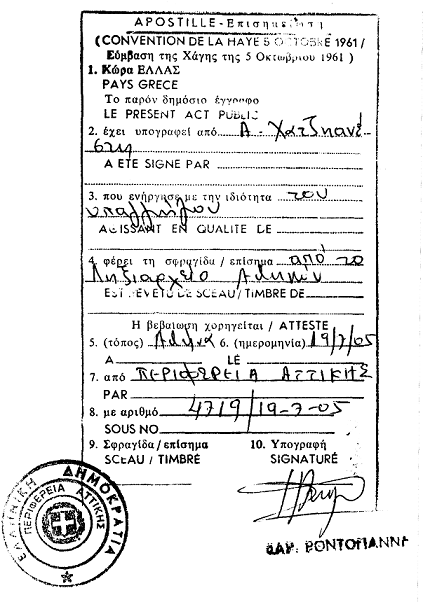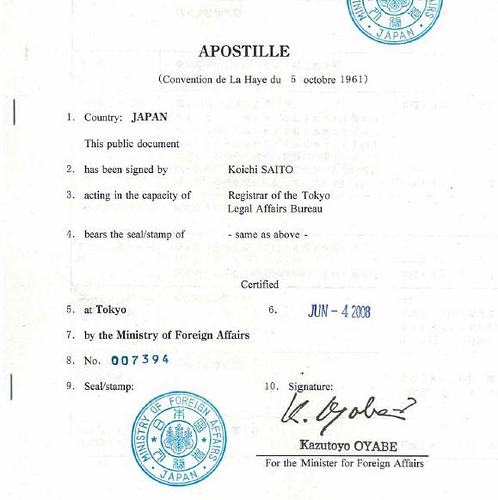Apostille Seal

We have years of experience acquiring Apostille Certification for both individuals and businesses.
We provide Apostille Seal services for a wide variety of public documents and all major 122 Hague Convention countries. Some of the key countries for which we provide premium Apostille UK, India, USA, Australia, Ireland, South Africa and New Zealand.
Below is a list and explanation of the main type of Apostille documents for which we have experience acquiring Apostille Seal:
Civil Status Documents
Civil status documents include certificates such as birth certificates, marriage certificates, divorce decrees, and death certificates. Such documents fall within the scope of “administrative documents” under Article 1(2)(b) and are therefore public documents on which Apostille Seal can be issued.
Though differences exist among States, administrative documents typically include the following documents besides the ones mentioned above:
- certificates of non-impediment;
- extracts from official registers (e.g., company registers, property registers, intellectual property registers, population registers);
- grants of patent or other intellectual property rights;
- grants of licence;
- medical and health certificates;
- criminal and police records; and
- educational documents such as “Apostille Diploma” or Apostille Degree.

-
Certified copies of original public documents
Practice differs among Contracting States regarding the application of the Convention to certified copies of public documents:
In some cases, domestic law may require a public document (e.g., a birth certificate or judgment) to remain in the custody of the issuing authority. The issuing authority may nevertheless be authorized to execute a copy of the original (which may be referred to as a certified copy, official copy, certified extract, etc.). In these cases, an Apostille Seal might be issued to authenticate the copy.
In some cases, a third party (e.g., a notary) is authorised to certify a copy of a public document. In these cases, the Apostille Seal will generally be issued to authenticate the origin of the certificate executed by the third party (e.g., a notarial certificate), although some States allow an Apostille to be issued to authenticate the origin of the original document.
Simple photocopies of original public documents
The Convention applies to simple photocopies where the law of the State of origin considers the photocopy itself to be a public document for the purposes of the Convention (C&R No 73 of the 2009 SC, which notes that at least one State follows this practice). In this case, an Apostille Seal was issued even for the simple photocopy. However in most States, a simple photocopy is not a public document and will therefore need to be appropriately certified before an Apostille Seal is issued.
Scanned copies of original public documents
An Apostille Seal can also be applied to an electronic copy of a public document that is done by scanning the public document if the law of the State of origin considers the scanned copy itself to be a public document for the purposes of the Convention. The law may provide that a scanned copy will only be a public document if the scanning is done by an authority (such as the one that executed the original document or by the Competent Authority).
In most States, however, a scanned copy is not a public document. It may nevertheless be possible for the scanned copy to be electronically certified (e.g., by way of e-notarisation or other form of electronic authentication performed by lawyers, post officers, bank officials, etc.).
Where this applies, the electronic certificate becomes the public document for the purposes of the Convention, provided that the law of the State in which the electronic certificate is executed considers it to be a public document for the purposes of the Convention.
Criminal and Extradition matters
In general, criminal and police records either emanate from authorities or officials connected with courts or tribunals and therefore fall within Article 1(2)(a), or fall within the category of administrative documents under Article 1(2)(b). Accordingly, they are considered public documents for the purposes of the Convention and an Apostille Seal can be issued on such documents.
The Special Commission also recognized that the Convention may apply to extradition requests (C&R No 16 of the 2012 SC). Indeed, such requests are typically made by prosecutors, Ministries of Justice, or judges, and therefore fall within either Article 1(2)(a) or 1(2)(b). Accompanying documents in support of an extradition request may also be of a public nature and thus carry an Apostille Seal.
An extradition treaty between Contracting States or the laws of a particular Contracting State may provide for a specific form of authentication for extradition requests and supporting documentation, or even abolish such a formality for some or all of the documents. Such provisions are not inconsistent with the Convention, provided that they do not impose formalities that are more rigorous than those under the Apostille system (cf. Arts 3(2) and 8).
An example of a specific form of authentication in extradition proceedings can be found in the United States of America, where the law provides for certain documents tendered in evidence to be accompanied by a certificate issued by a US diplomatic or consular officer located in the requesting State that the documents are in such form as to be admissible in the tribunals of that State.
Property Rights
Apostille Seals for Private Documents where execution of the Private documents may involve a notary, in which case the notarial act or notarial certificate is a public document for the purposes of the Convention by virtue of Article 1(2)(c) and (d) of the Convention. Examples of such documents can be wills and other testamentary dispositions, contracts, powers of attorney, letters of recommendation, curriculums vitae, and company documents.
For more documents please go to Apostille Notary page.
Important related links
Apostille Certification services
FAQ – Frequently Asked Questions
Apostille for Education Documents
Apostille Notary Services for a wide range of documents
Hague Convention countries
Non Member states by Accession
Member states by Accession